PHOTOS: President Putin votes in referendum intended to keep him in power
Russian President Vladimir Putin cast his ballot at a polling station in Moscow on Wednesday, in a constitutional referendum that could extend his reign until he is 84 and give him immunity from prosecution when he retires.
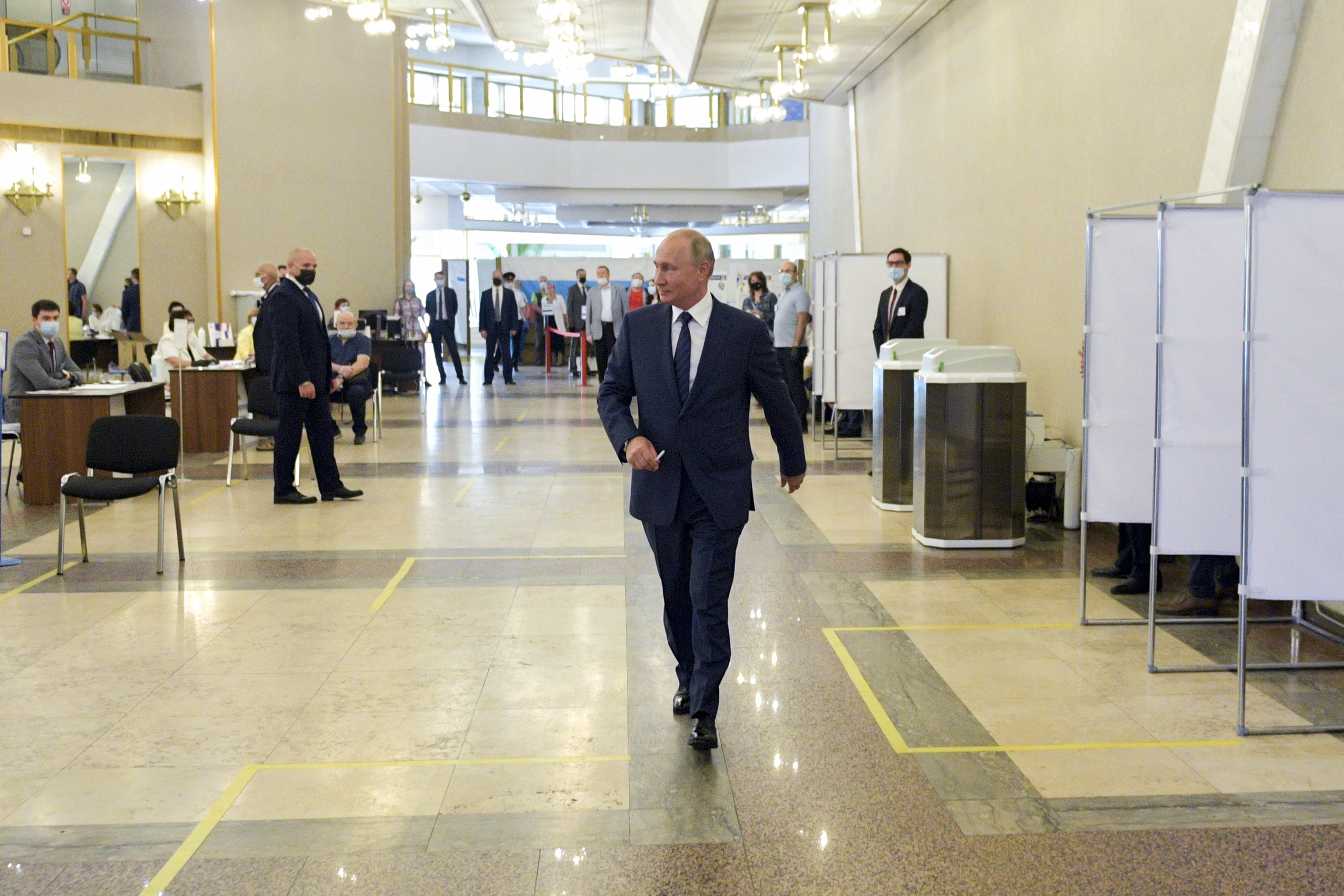 Russian President Vladimir Putin arrives to take part in voting at a polling station in Moscow, Russia, on Wednesday, July 1. Alexei Druzhinin, Sputnik/Kremlin Pool Photo/AP
Russian President Vladimir Putin arrives to take part in voting at a polling station in Moscow, Russia, on Wednesday, July 1. Alexei Druzhinin, Sputnik/Kremlin Pool Photo/AP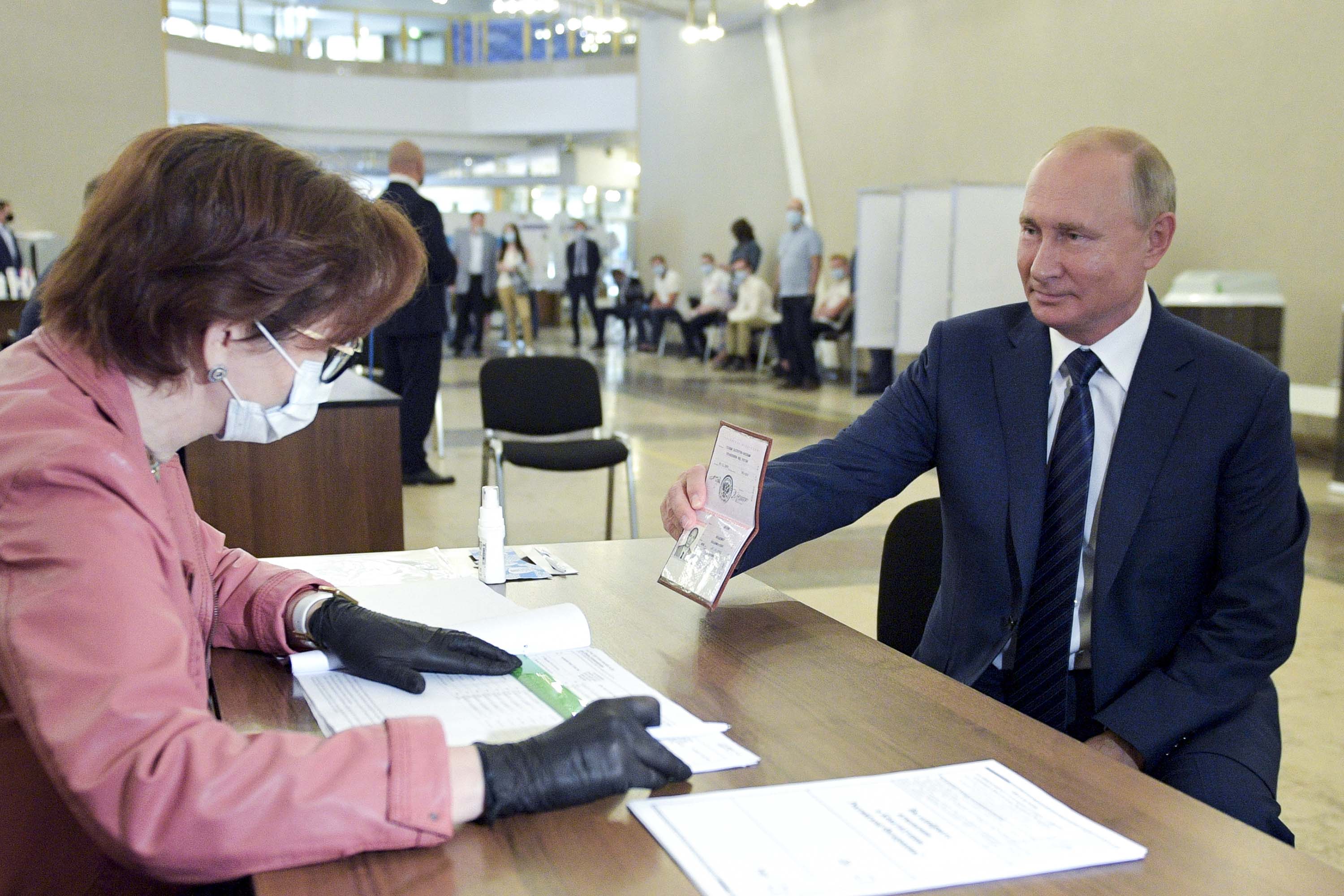 Russian President Vladimir Putin shows his passport to a member of an election commission as he arrives to take part in voting at a polling station in Moscow, Russia, on Wednesday, July 1. Alexei Druzhinin, Sputnik/Kremlin Pool Photo/AP
Russian President Vladimir Putin shows his passport to a member of an election commission as he arrives to take part in voting at a polling station in Moscow, Russia, on Wednesday, July 1. Alexei Druzhinin, Sputnik/Kremlin Pool Photo/APWhat the referendum could mean for LGBTQ rights
From CNN's Nathan Hodge
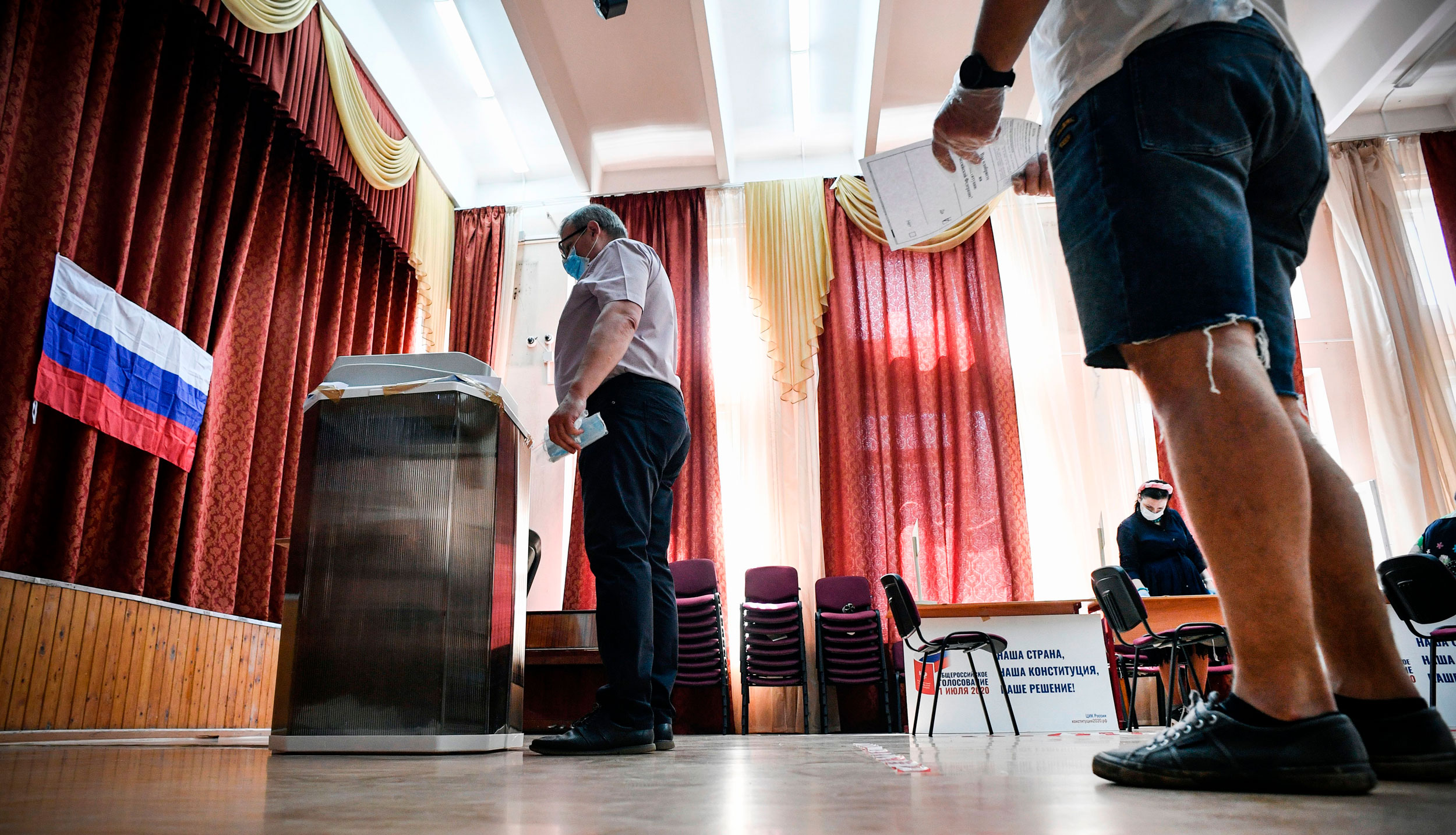 A man casts his ballot in a nationwide vote on constitutional reforms at a polling station in Moscow on July 1. Alexander Nemenov/AFP via Getty Images
A man casts his ballot in a nationwide vote on constitutional reforms at a polling station in Moscow on July 1. Alexander Nemenov/AFP via Getty ImagesA raft of amendments designed to appeal to conservative voters and "family values" are also on Wednesday's ballot, including a ban on gay marriage.
The proposed change on marriage falls in line with Russia's previous discriminatory policies towards the LGBTQ community, which includes the so-called "gay propaganda" law that virtually bans any public discussion of LGBTQ issues.
The controversial amendment defines marriage as a "union between a man and a woman." Russian law does not permit same-sex marriages or partnerships, and adoption laws generally bar same-sex couples from adopting.
Here's the amendment that we’re talking about:
For both the Russian Federation and subjects of the Russian Federation [the values] are: ... protection of the family, motherhood, fatherhood and childhood; defense of the institution of marriage as a union of a man and a woman; the creation of conditions for a decent upbringing of children in the family, as well as for the responsibilities of adult children to care for parents ... "
And this is the language from the official booklet on amendments to the constitution:
Amendments support traditional family values: marriage as a union of man and woman, respect for children to elders, trust and care of all generations of a family for each other.
Activists spell out "2036" in Red Square protest over referendum: Local TV
From CNN's Nathan Hodge
A group of activists laid down in Red Square in the form of the numbers 2036 in a protest over the nationwide referendum that could see President Vladimir Putin's rule extended until that date, the independent news channel TV Rain reported.
Video posted by TV Rain correspondent Maria Borzunova showed the activists lying down on the cobblestones in front of Lenin's Tomb.
TV Rain reported that the activists -- who included Moscow municipal deputy Lucy Shteyn -- were detained and subsequently released without charge.
Will Wednesday's referendum prompt a new wave of street protests?
From CNN's Nathan Hodge and Mary Ilyushina
That's difficult to predict, but members of the country's small and embattled opposition have already raised questions about tampering and irregularities in the referendum. Polls have been open for early voting since last week, a measure cast by election officials as a coronavirus precaution to allow social distancing.
Some Russians have taken to social media to show their preference, posting NYET (no) on their profiles. Residents of Moscow and other large cities glued anti-Putin stickers next to pro-amendments posters. Others have taken note of a curious fact: Copies of the constitution recently went on sale in bookstores, with the amendments already included, something widely commented on in social media. That suggested to many Russians that the fix was in.
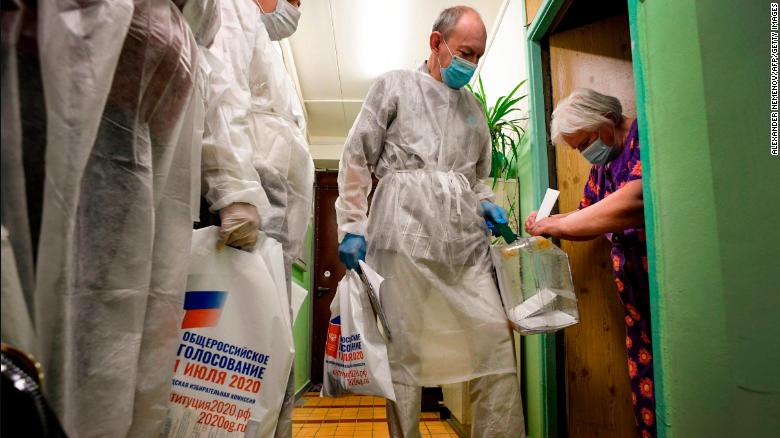 Voting by mobile ballot box in Moscow on Monday.
Voting by mobile ballot box in Moscow on Monday.Even before the vote kicked off last week, independent outlets and NGOs posted dozens of screenshots and audio messages suggesting forced voting by employers of big corporations and state-financed organizations.
"In the past few days we have also seen a large numbers of ballot stuffing, so it feels like at some stage it was clear to [the organizers] that the administrative resources to mobilize controlled electorate are running out, they may also be voting in a slightly different way compared to a desired one and they've resorted to good old ways of rigging," Stanislav Andreychuk, co-charman of the non-governmental group Golos, told CNN.
According to Andreychuk, this plebiscite is way less regulated than previous elections his organization monitored: Voting booths set up on park benches violate the secrecy of voting, the usual restrictions on releasing exit polls are not enforced and unregulated campaigning -- aided by raffles promising apartments to lure voters to stations -- muddy the voter's right to freely exercise their will.
Widespread allegations of voting fraud that followed 2011 parliamentary elections led to a wave of pro-democracy protests that deeply worried the Kremlin, but Wednesday's referendum results appear to be a foregone conclusion.
In early count, Russians vote in favor of constitutional amendments
From CNN's Nathan Hodge
Russia's Central Election Commission (CEC) on Wednesday released a preliminary tally of results in a nationwide referendum on constitutional reform, saying 73% of the citizens who voted support amendments.
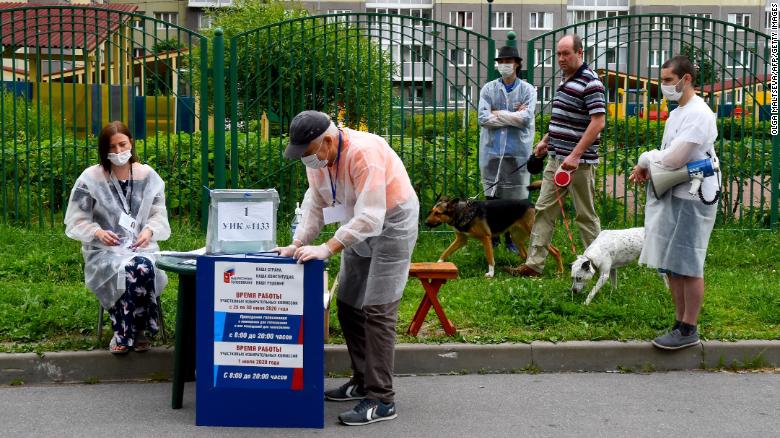 An outdoor polling station in Saint Petersburg.
An outdoor polling station in Saint Petersburg.In a departure from practice in presidential elections, the CEC released the statement on Twitter at around 3:00 pm Moscow time, five hours before polls close in the capital. The statement gave no more specifics about where those votes had been counted; polls at that point had already closed in Russia's Far East.
The Russian government opened early voting last week in what was described as a measure to encourage social distancing amid coronavirus, but critics have said the government has drawn out the vote and declared Wednesday a national holiday to encourage voter turnout.
In a statement Wednesday, CEC head Ella Pamfilova defended the process, saying, "For the entire voting period, serious violations that would have required Central Election Commission proceedings were not found."
The constitutional amendments will pave the way for Russian President Vladimir Putin to remain in power until 2036.
Russians hit the reset button for Putin, but questions of legitimacy linger over his long-term rule
Analysis by CNN's Nathan Hodge and Mary Ilyushina
On Wednesday, voters across Russia will have a chance to hit the reset button for Vladimir Putin: A national referendum will decide whether to approve a raft of constitutional amendments that will allow the Russian president to run for two more terms in office, potentially extending his tenure until 2036.
But more is at stake than just a resetting of term limits. The vote has also become a referendum on the system that has been built around Putin during his two decades in power. As many observers of Russia note, Putin's system of "vertical power" makes him the final arbiter among elites, and their fortunes are, quite literally, tied to him remaining in charge.
Russia in 2020 is not a dictatorship in the classic sense: Putin depends on regular elections as a kind of plebiscite to lend legitimacy to his rule. To be sure, Russia's political system lacks checks and balances: The parliament is packed with loyalists and what Russians call a "pocket" (i.e. powerless) opposition; the president has wide latitude to hire and fire regional leadership; and the courts defer to executive power.

 5 years ago
706
5 years ago
706 


